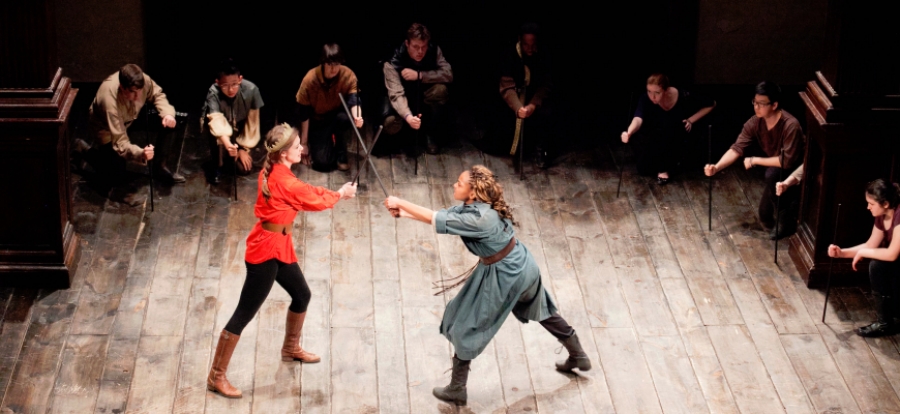"Simply telling pupils that Shakespeare wrote for the stage is not enough."
When you’re 14, it’s unlikely, though not impossible, that you care about unrequited love or that a man accuses his fiancée of infidelity at the altar. Much less in a story written over 400 years ago in English that seems counter-intuitive.
The key, then, is to remove or to re-appropriate these obstacles: language and subject matter. First and foremost, the language needs to be placed into context. Simply telling pupils that Shakespeare wrote for the stage is not enough. What does that mean? How does writing for the stage differ from writing for the page, and for a reader? What was the early modern theatrical world actually like? Who was Shakespeare writing for: which actors, audiences, patrons? These questions actively engage pupils in re-considering text as something living, something organic.
Understanding the language of theatre is fundamental in breaking down those unhelpful myths around Shakespeare’s poetic and terribly ‘important’ language of literature. The difference between describing a night sky to an audience in a public open-air theatre and showing one in a film is entirely linguistic. Whether we’re explaining Hamlet’s ‘antic disposition’, Claudio’s jealousy, Coriolanus’ pride or Titus’ wrath, we’re talking about devised, calculatedly hyperbolic theatricality. All of it comes from the language.
As for subject matter, like language, context is the key. I find that myth-busting is a good place to start to overcome those lazy generalisations: all women were inferior, everyone got married young, nobody could read or write. Paint the Elizabethan and Jacobean Englands as rich, colourful, diverse and even scandalous places, and suddenly the street fight between the Montagues and Capulets becomes more intense, and Juliet’s marriage is actually far more troubling than romantic.
How about trying out a new type of play? Swap late-night, under-aged window serenades for vengeance and pies. Or fairies in a wood for shepherds"There are stories and characters in every play that pupils can engage with." in a forest. There are stories and characters in every play that pupils can engage with and even come to care for, if they wish. Encourage pupils to retell Shakespeare’s story in a world more familiar to themselves. How do those stories differ? Where are the cross-overs? How have film, theatre, opera and dance directors dealt with these stories? What do their versions tell you, or add to / change, about your understanding of the play? Encouraging pupils to engage with the subject matter both within and outside of its context is a fundamental step in teaching and exploring Shakespeare’s work.
The four would-be academics in Love’s Labour’s Lost agree that knowledge and understanding come from experience: “where we are our learning likewise is”. No matter what these characters do, they believe that they are learning something - however grand or trivial. This is because they are learning in a personal way: transcending the unintuitive, archaic and generally ‘old’, to recognise that context changes everything. Perhaps making Shakespeare’s language and subject matter a personal experience can, in turn, help to make ‘learning’ about his work part of a pupil’s actual world and more ‘where I am’ as opposed to ‘where I’m expected to be’. Making a pupil feel worthy or empowered to read, watch, talk about and even enjoy Shakespeare’s plays must surely be the ultimate goal of any teacher.
Do you use these tactics? Share your experiences below.


















